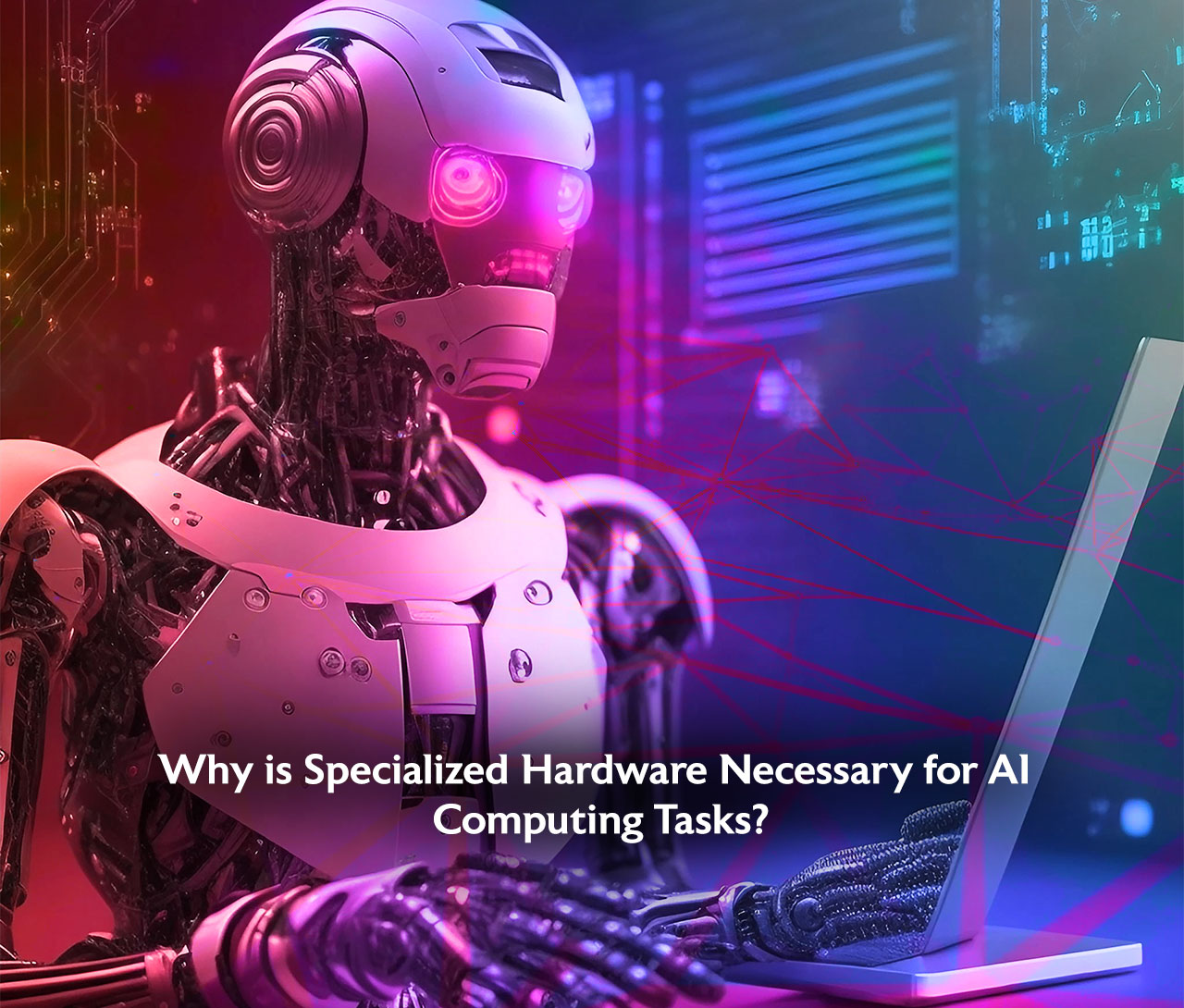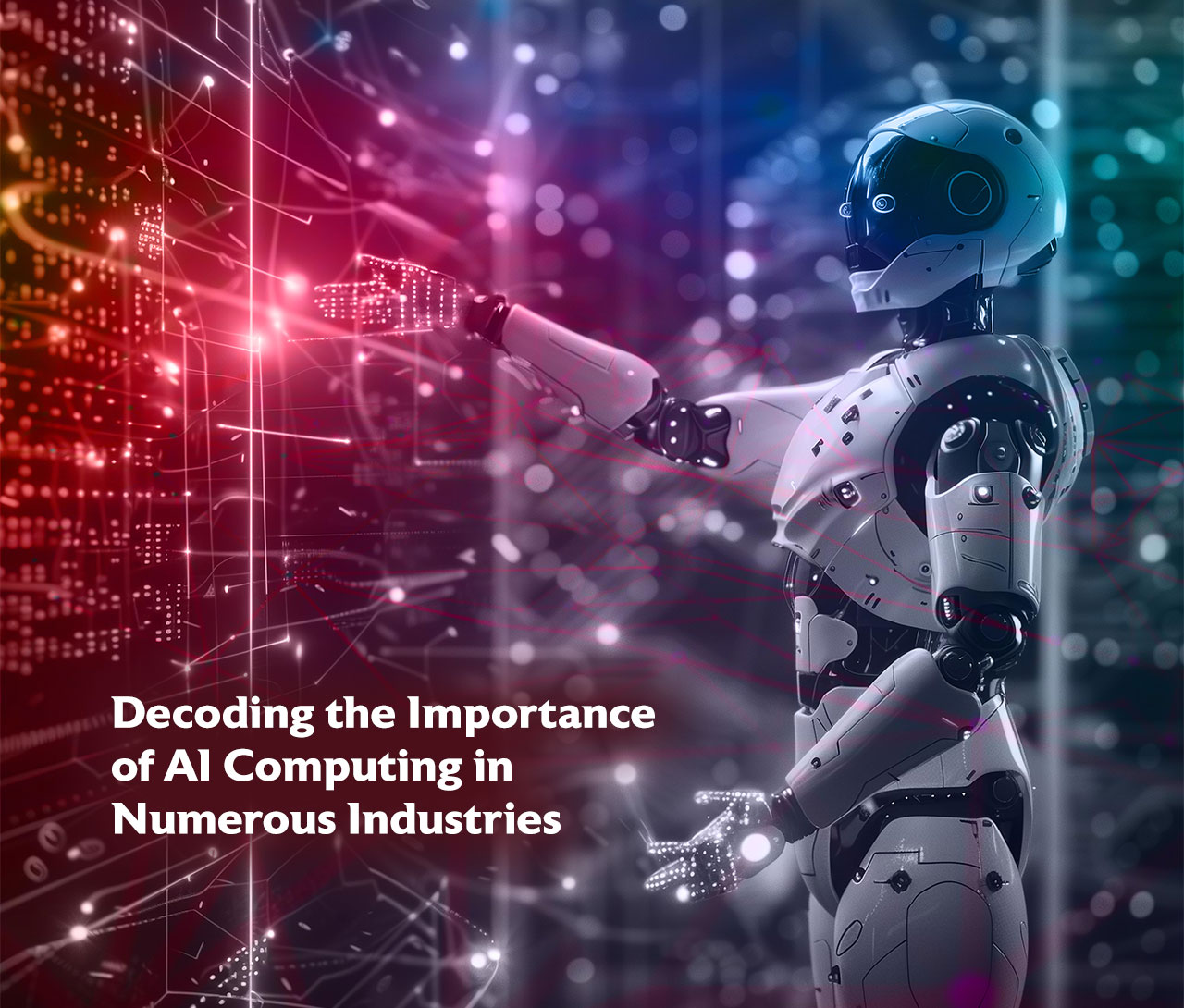In today’s fast-paced world, artificial intelligence (AI) has become a driving force behind innovation and technological advancement. According to Statista, the AI market is projected to reach $184 billion in 2024. From autonomous vehicles to personalized recommendations, AI is transforming industries and revolutionizing the way we live and work. But what exactly powers this remarkable technology? The answer lies in AI computing. Let’s understand everything about it.
What is AI Computing?
AI computing refers to the specialized hardware and software systems designed to process the massive amounts of data required for AI applications. This includes tasks such as machine learning, natural language processing, computer vision, and more. Traditional computing systems are often not equipped to handle the complex calculations and algorithms needed for AI, so AI computing has emerged as a separate and essential field.
Role of GPUs and TPUs
Graphics processing units (GPUs) and tensor processing units (TPUs) are two types of hardware commonly used in AI computing. GPUs are well-suited for parallel processing tasks, making them ideal for training deep learning models. TPUs, on the other hand, are specifically designed to accelerate machine learning workloads and are known for their speed and efficiency.
The Rise of AI Accelerators
In recent years, there has been a surge in the development of AI accelerators – specialized chips and hardware optimized for AI tasks. These accelerators are designed to significantly speed up AI workloads and improve performance. Companies like NVIDIA, Intel, and Google have been at the forefront of this innovation, pushing the boundaries of what is possible with AI computing.
History of AI Computing
The concept of artificial intelligence traces back to Alan Turing, the British mathematician pivotal in deciphering coded messages during WWII. Turing articulated the desire for a machine capable of learning from experience in a 1947 lecture in London. Turing’s vision materialized in 2012, marked by the development of AI models surpassing human capabilities in image recognition speed and accuracy. Over time, AI has made remarkable strides, thanks to improvements in computing power and the availability of vast data resources. In the 1990s, the term “artificial intelligence” faced some hurdles, leading to the rise of more tempered variations like “advanced computing.” Nonetheless, milestones such as IBM’s Deep Blue defeating Garry Kasparov in chess in 1997 demonstrated AI’s potential.
Also Read: Edge AI: The Definitive Guide
Today, AI continues its swift evolution, marked by advancements in neural networks and deep learning. The quest for artificial general intelligence, where machines emulate human cognitive abilities, remains a focal point of ongoing research. As AI becomes increasingly ingrained in our daily lives, considerations of trust, privacy, transparency, ethics, and the human touch have emerged as significant concerns.
Benefits of AI Computing
- Increased Efficiency: AI automates repetitive tasks, boosting efficiency and productivity.
- Enhanced Decision-Making: AI analyzes vast data sets, offering valuable insights for data-driven decisions.
- Improved Accuracy: AI systems execute tasks with precision, minimizing human errors.
- Advanced Data Processing: AI processes large data volumes swiftly, facilitating rapid insights and predictions.
- Personalization: AI algorithms tailor user experiences based on individual preferences, offering personalized recommendations.
- Automation of Complex Tasks: AI automates tasks requiring human intelligence, freeing resources for strategic endeavors.
- Improved Customer Service: AI-powered chatbots provide 24/7 support, addressing queries and aiding with tasks.
- Enhanced Healthcare: AI aids in disease diagnosis, treatment planning, and drug discovery, improving healthcare outcomes.
- Increased Safety and Security: AI enhances surveillance, threat detection, and cybersecurity measures.
- Innovation and Advancements: AI drives innovation across industries, leading to new products, services, and solutions.
Why is Specialized Hardware Necessary for AI Computing Tasks?
 Specialized hardware plays a crucial role in AI computing tasks for several reasons. Firstly, AI algorithms demand intensive computational power to process and analyze vast datasets. While general-purpose CPUs can handle basic AI functions, they often lack the efficiency and speed required for complex workloads. Specialized hardware, including GPUs, TPUs, and ASICs, is tailored to optimize AI computations, offering superior performance and energy efficiency.
Specialized hardware plays a crucial role in AI computing tasks for several reasons. Firstly, AI algorithms demand intensive computational power to process and analyze vast datasets. While general-purpose CPUs can handle basic AI functions, they often lack the efficiency and speed required for complex workloads. Specialized hardware, including GPUs, TPUs, and ASICs, is tailored to optimize AI computations, offering superior performance and energy efficiency.
Secondly, specialized hardware architectures are adept at managing the parallel nature of AI algorithms. GPUs, for instance, boast thousands of smaller cores optimized for parallel processing, making them ideal for AI tasks involving extensive data and complex mathematical operations. This parallelization capability enables specialized hardware to execute computations hundreds of times faster than general-purpose CPUs, rendering them indispensable for AI workloads.
Moreover, specialized hardware significantly reduces the time and cost associated with algorithm training and execution. By harnessing optimized architectures and specific operations tailored to neural networks, hardware like TPUs and NPUs accelerate AI computations and enhance the performance of tasks such as image recognition and language processing.
How Does AI Computing Work?
- AI computing involves machine learning systems and software analyzing vast data to uncover insights and develop new capabilities.
- Specialized hardware like GPUs and TPUs optimizes AI computations for high performance and energy efficiency.
- AI systems employ machine learning techniques to autonomously learn from and adapt to new data.
- Computer vision algorithms interpret visual information by analyzing images and objects.
- Natural Language Processing (NLP) enables machines to comprehend human language, aiding communication.
- Neural networks mimic human neural cells to process data and capture relationships between variables.
- AI systems automate tasks, solve complex problems, and drive data-driven decisions across industries.
- It enhances human capabilities and productivity while posing ethical, social, legal, and security risks requiring responsible management.
What are the Limitations of AI Computing?
- Algorithmic Constraints: AI is bound by algorithms and predefined instructions, lacking creativity, sentience, or consciousness.
- Data Dependency: AI algorithms rely on extensive data sets to learn and function effectively, making them reliant on data availability and quality.
- Limited Transferability: AI struggles to transfer knowledge across different domains, lacking the adaptability of human intelligence.
- Ethical Considerations: AI raises ethical concerns regarding transparency, bias in data, and decision-making, necessitating careful consideration to ensure fairness and accountability.
- Resource Intensiveness: Advanced AI algorithms demand high computing power and specialized hardware, posing accessibility challenges for smaller organizations and environmental concerns due to energy consumption.
- Lack of Emotional Understanding: AI cannot comprehend or express human emotions, limiting its effectiveness in contexts requiring empathy or emotional intelligence, such as crisis management.
Future of AI Computing
The future of computing holds immense promise, driven by advancements in machine learning, natural language processing, and neural networks. Anticipated developments include:
- Enhanced Personalization: AI will facilitate highly personalized experiences in the healthcare, retail, and entertainment sectors by understanding individual preferences and tailoring services accordingly.
- Ethical Considerations: With AI’s increasing integration into society, ethical concerns like data privacy, bias mitigation, and transparency will gain prominence in AI development. Striking a balance between innovation and responsible AI usage will be paramount.
- Collaborations: AI will work alongside humans, improving their capabilities and supporting intricate decision-making processes, rather than taking their place. Innovation and productivity will increase as a result of this collaboration.
Decoding the Importance of AI Computing in Numerous Industries
 Healthcare: AI-powered systems revolutionize medical practices by analyzing data, aiding in diagnosis, predicting outcomes, and assisting in drug discovery. This enhances patient care, tailors treatments, and streamlines healthcare processes.
Healthcare: AI-powered systems revolutionize medical practices by analyzing data, aiding in diagnosis, predicting outcomes, and assisting in drug discovery. This enhances patient care, tailors treatments, and streamlines healthcare processes.- Finance: AI algorithms analyze data fraud, automate trading, track financial data, and provide personalized investment advice. This improves risk management, decision-making, and financial operations.
- Manufacturing: AI-driven automation enhances efficiency, quality control, and predictive maintenance in manufacturing. It enables predictive maintenance, reduces downtime, and boosts productivity.
- Customer Service: AI chatbots and virtual assistants elevate customer support with instant responses and personalized recommendations. This fosters greater satisfaction, faster responses, and cost savings for businesses.
- Autonomous Vehicles: AI enables self-driving cars to perceive their surroundings, make decisions, and navigate safely. This innovation revolutionizes transportation, enhancing safety and efficiency while paving the way for autonomous mobility services.
End Note
AI computing has emerged as a transformative force, revolutionizing industries and driving innovation. It provides greater efficiency, accuracy, and decision-making capabilities through the automation of processes, analysis of large volumes of data, and intelligent decision-making.





